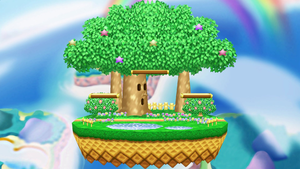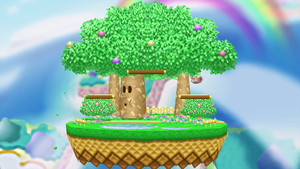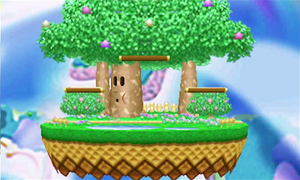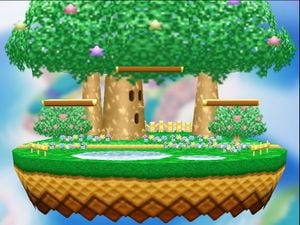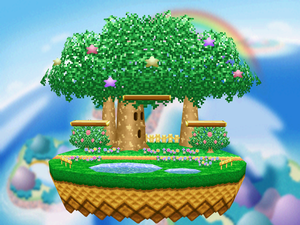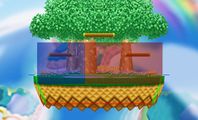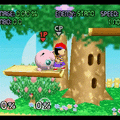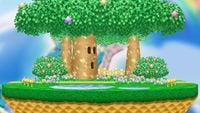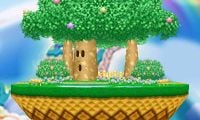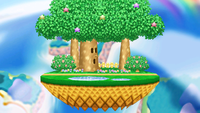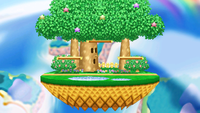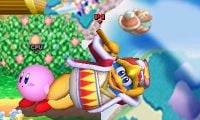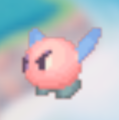| Welcome to SmashWiki! Log in or create an account and join the community, and don't forget to read this first! |
| Notices |
|---|
| The Skill parameter has been removed from Smasher infoboxes, and in its place are the new "Best historical ranking" and "Best tournament result" parameters. SmashWiki needs help adding these new parameters to Smasher infoboxes, refer to the guidelines here for what should be included in these new parameters. |
| When adding results to Smasher pages, include each tournament's entrant number in addition to the player's placement, and use the {{Trn}} template with the matching game specified. Please also fix old results on Smasher pages that do not abide to this standard. Refer to our Smasher article guidelines to see how results tables should be formatted. |
| Check out our project page for ongoing projects that SmashWiki needs help with. |
Dream Land
| Kirby Dream Land Dream Land (64) | |
|---|---|
 Dream Land (SSB) as it has appeared in the Smash series. | |
| Universe | Kirby |
| Appears in | SSB Melee SSB4 Ultimate |
| Availability | Starter (SSB and Ultimate) Unlockable (Melee) Downloadable (SSB4) |
| Unlock criteria | Complete Target Test with every character. (Melee only) |
| Crate type | Presents (3DS and Ultimate) Normal (SSB, Melee, and Wii U) |
| Maximum players | 4 (SSB, Melee, and 3DS) 8 (Wii U and Ultimate) |
| Article on Wikirby | Dream Land |
| “ | Beware the wind that blows from the Whisper[sic] Woods - it just might blow you away. | ” |
| —Super Smash Bros.' instruction manual | ||
Dream Land (プププランド, Pupupu Land) is a stage that debuted in the original Super Smash Bros. It returns in Super Smash Bros. Melee with the name Past Stages: Dream Land and is unlocked by beating Target Test with every character. It is also available as downloadable content in both versions of Super Smash Bros. 4 on June 14th, 2015, and in the base game of Super Smash Bros. Ultimate. In those games, as with other returning stages from the first Smash Bros. game, some of the textures are slightly higher in quality, but the general overall primitive look of the original is retained.
In the original Super Smash Bros., Dream Land is Kirby's stage, the location of Stage 7 in the 1P Game, and also the stage where Ness is fought while being unlocked, possibly because both characters come from games developed by Smash 64 developer HAL Laboratory. Small, Kirby Beta Stage 2, and the How to Play stage are all similar to this stage, and can be found in the debug menu.
Stage overview[edit]
The stage features three static floating platforms above a main one, a simple layout which in later games was inherited by Battlefield. Whispy Woods, a recurring boss in the Kirby series, is also in the middle of the stage, facing left. He will blow wind toward one side of the stage every so often to affect the battle. His wind seems a little less powerful than it is in Melee's similar stage Green Greens, where he can blow characters off the ledge. Bronto Burts and King Dedede can also be seen flying in the far background as cameo appearances; although when King Dedede himself is present in the match, he won't appear.
Whispy's wind in Smash 64. Notice that Jigglypuff and Ness move while performing Sing and sleeping respectively, motions that would otherwise be impossible to move during.
Ω forms and Battlefield form[edit]
The Ω form removes the three soft platforms, extends the length of the stage slightly to match that of Final Destination, and completely flattens out the ground, meaning that tripping now behaves normally rather than only working when pushing opponents away from the centre. Whispy Woods still turns and blinks, but will not blow wind anymore. Oddly, the design of the Ω form is different in game to how it appears in the preview.
In Super Smash Bros. Ultimate, the Ω form is similar to SSB4's Ω form, and Battlefield form is similar to the normal form; however, it is resized and reshaped to match Final Destination and Battlefield, respectively. The three soft platforms of the Battlefield form are based on the ones in the normal form.
Hazards Off[edit]
With hazards turned off in Ultimate, Whispy Woods does not blow wind, making the stage very similar to its Battlefield form.
Origin[edit]
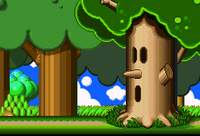
This stage is loosely based on Green Greens, which is located in Dream Land, from Kirby's Dream Land and Kirby Super Star's Spring Breeze. Whispy Woods, a sentient apple tree, first appeared in Kirby's Dream Land as the first boss and has appeared in numerous Kirby games since. In most games, he attacks by dropping apples over Kirby and shooting gusts of air at him. In this stage, Whispy Woods still blows out air, but this only pushes fighters without damaging them.
King Dedede is a recurring antagonist in the Kirby series. One of the attacks King Dedede uses in Kirby's Adventure and Kirby Super Star is to puff up and try to ram into Kirby. King Dedede can be seen flying in the background of this stage puffed up, and he looks similar to his appearance in Kirby's Dream Land 3. Bronto Burts are a common enemy throughout the Kirby series as well, and one of them can be seen flying across the background of this stage; resembling their design in the concurrently-developed Kirby 64: The Crystal Shards.
Tournament legality[edit]
Super Smash Bros.[edit]
This stage is universally neutral, and is currently the only legal stage in most rulesets. The general given reason why it is legal is that it is the most "balanced" or "standard" stage, with a basic layout and size that makes it less campy than Hyrule Castle or Congo Jungle. The stage also has only one type of hazard (the wind), which barely affects gameplay compared to the tornadoes on Hyrule or the barrels on Congo. This stage is also currently the only legal doubles stage.
In general, characters like Pikachu and Kirby benefit from this stage, due to its small size and potential for characters to get early gimps or start early combos to rack up high damage. The stage is very good for quick 0-death combos, as well as characters who can combo into an edgeguard/gimp easily. The high top platform also makes top platform camping a good strategy, especially for characters with multiple jumps like Kirby and Jigglypuff.
The combo game of Ness and Samus also benefits greatly from Dreamland's many platforms, as they can do down-air tech chases into a finisher (up-air or grab for Ness, back-air for Samus) which would not be possible on the ground because the opponent's tech rolls would place them far enough away. Donkey Kong benefits in a similar way using platform drop up-airs.
Link and Fox, who rely on projectile camping and get gimped easily get nerfed on this stage compared to Hyrule. The much smaller size gives less space to projectile camp, which they use to disrupt opponent approaches and set up the eventual close combo when the opponent is vulnerable. The top platform also gives opponents a place to avoid projectiles and camp them back.
Super Smash Bros. Melee[edit]
This stage is neutral in Melee as well. The stage is slightly larger in Melee than it is in Smash 64, along with having a much higher ceiling. This is generally considered the best stage for Peach, Jigglypuff, and Samus (against certain characters), and is considered a bad stage for Marth and the Ice Climbers.
The very high ceiling of the stage provides a large advantage for floaty characters, as it makes them significantly less vulnerable to quick vertical KO setups, such as Fox's up throw to up aerial combo or Marth's up tilt. Additionally, the large stage size and higher platform placement compared to other three-platform neutral stages allow for greater flexibility in movement and spacing, especially for characters like Captain Falcon, Fox, and Falco. The placement of the highest platform also serves as an outpost for certain characters to escape pressure, allowing easier camping and employment of defensive strategies. Due to this, Dream Land greatly benefits players who are stronger in the neutral game, and generally fosters slightly slower and more methodical gameplay compared to smaller neutral stages.
However, Dream Land hinders characters who rely on platform pressure or require close quarters to pressure opponents. The Ice Climbers are perhaps the most hindered by this, as their harder matchups become even more difficult. The large stage size gives characters like Fox and Peach more room to camp them, avoid wobbling, and employ hit-and-run strategies that they cannot properly combat due to their poor aerial game. Marth is also hindered by Dream Land; while the stage enables him to make better use of his movement, the higher platform placement makes it harder or impossible for his grounded attacks to strike through them from below, hindering his ability to pressure opponents on platforms. In addition, Dreamland's large ceilings make Marth's weaknesses shine more, as he is infamously less capable of killing than other adjacent top tiers.
Super Smash Bros. 4[edit]
Dream Land has shrunk to about the size of Battlefield, evident by Star KO'd characters now being obscured by Whispy Woods. For the first time, it is not a universally neutral stage; though the blast lines are actually average in comparison to Smash 4's other legal stages, the top platform is much closer to the ceiling compared to Battlefield. As a result, the stage favors characters with primarily vertical finishers, such as Zero Suit Samus, Meta Knight, and Ryu. This advantage has resulted in the stage being viewed as less fair than Battlefield, and with Whispy Woods as the only stage hazard, some tournaments feature Dream Land as a counterpick. Only one tournament, Super Smash Con 2015, has banned Dream Land (64) entirely. Oddly, the stage acts as though the main platform is slanted slightly towards the centre of the stage, and this has the effect of causing moves that would ordinarily launch at an angle of 0 degrees to very briefly lift the opponent off the ground if launching them towards the centre. This also means that such moves cannot cause tripping if they knock opponents towards the centre.
Super Smash Bros. Ultimate[edit]
Dream Land is effectively identical to Battlefield by any practical measure with stage hazards off, due to very similar platform heights, the removal of Whispy Woods' wind, and only a slight difference in blast zones. Thus, in order to reduce redundancy, Dream Land is almost never legal.
Glitches[edit]
- In Melee, Marth and Roy will occasionally experience animation errors in some of their attacks — namely their neutral attack, all tilts, dash attack, and standing grab — if they are initiated when Whispy Woods starts blinking. The glitch causes their sword to be swung improperly, significantly reducing the attacks' range; in the case of standing grab, the opponent is pulled inside Marth or Roy, and they do not properly transition into their grabbing state. The exact cause of the glitch and whether it can happen to other characters are currently unknown. The glitch is called the whispy blink glitch.
- Sometimes, a Dedede will begin his flight across the back of the stage before another Dedede (going in the opposite direction) finishes his, causing them to overlap and appear at the same time for a moment.
- In Super Smash Bros. for Nintendo 3DS's Training Mode, there is a glitch where Dedede can appear in the background even if he is participating in battle, while he is not supposed to.
- Also in Super Smash Bros. for Nintendo 3DS, while characters being Star KO'd are correctly layered behind the tree, their highlight (if it's turned on) is not.
Gallery[edit]
Super Smash Bros.[edit]
King Dedede's cameo in the background of the Dream Land stage.
Bronto Burt's cameo in the background of the Dream Land stage.
Super Smash Bros. Melee[edit]
Kirby in the Melee version of Dream Land.
Bronto Burt's cameo in the background of the Dream Land stage.
Super Smash Bros. Ultimate[edit]
Names in other languages[edit]
Trivia[edit]
- A poll conducted in 2004 among Japanese players showed that they considered Dream Land the most balanced stage in both Smash 64 and Melee.[citation needed]
- The wind that Whispy Woods produces is strong enough that it can blow characters off the two lower soft platforms, which can be used for spamming Taunt cancels in Smash 64.
- Because of Whispy's placement, it also has the ability to blow players off the left but not the right ledge, which allows for an interestingly unique tactic: one may be blown offstage into a ledge hang, followed by ledge attacks which may be spammed as the wind continues. This is especially effective for characters like Fox, whose ledge attack retreats slightly upon completion.
- This is the only Past Stage in Melee which can appear before it is unlocked, as well as being the only Past Stage to appear in any mode other than Vs. Mode, appearing in Event 48: Pikachu and Pichu.
- If one counts the two versions of Super Smash Bros. 4 as different games, then this stage has the highest number of selectable appearances in the series, with five. Currently, the only installment without its inclusion is Brawl.
- This is the only DLC stage in the 3DS version to not use wooden Crates and Barrels, mostly because of its fantasy design.
- This is the only Smash 64 stage in Smash 4 where the background image functions identically to the original, whereas the other stages feature wrapped skyboxes.
- Double Dedede is a phenomenon that describes when there are two sprites of King Dedede flying in the background of Dream Land. Though rare, it can occur occasionally.
- Strangely, in Ultimate, while the preview icons for the Battlefield and Ω forms depict flowers and fences in the foreground, they are missing during gameplay.
- In Ultimate, the following Assist Trophies cannot appear on this stage: Skull Kid, the Moon, Devil and Squid Sisters. Ashley can only be summoned on the stage's Battlefield and Omega forms. Additionally, Lunala cannot be summoned here.
- Whispy Woods’s nose is not attached to his face. This can be seen if the game is paused and the camera is turned to the left or right.
- Whispy can't blow characters within a small space in front of him.[1]
- The right platform is slightly longer than the left platform, with its out edge extending further. The top platform is longer than the side platforms.
References[edit]
External links[edit]
| show Stages in Super Smash Bros. |
|---|
| show Stages in Super Smash Bros. Melee |
|---|
| show Stages in Super Smash Bros. 4 |
|---|
| show Stages in Super Smash Bros. Ultimate |
|---|
| show
|
|---|
